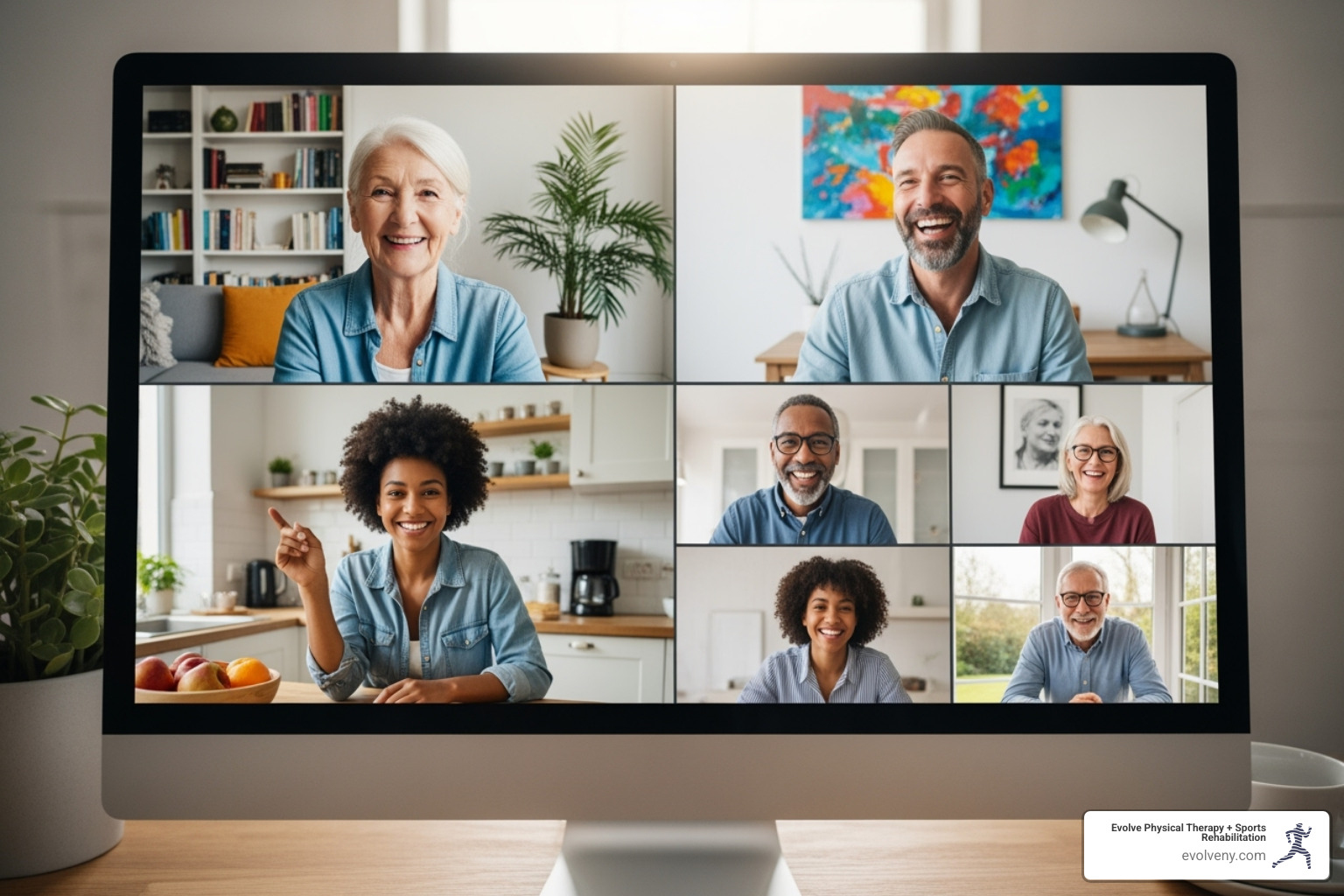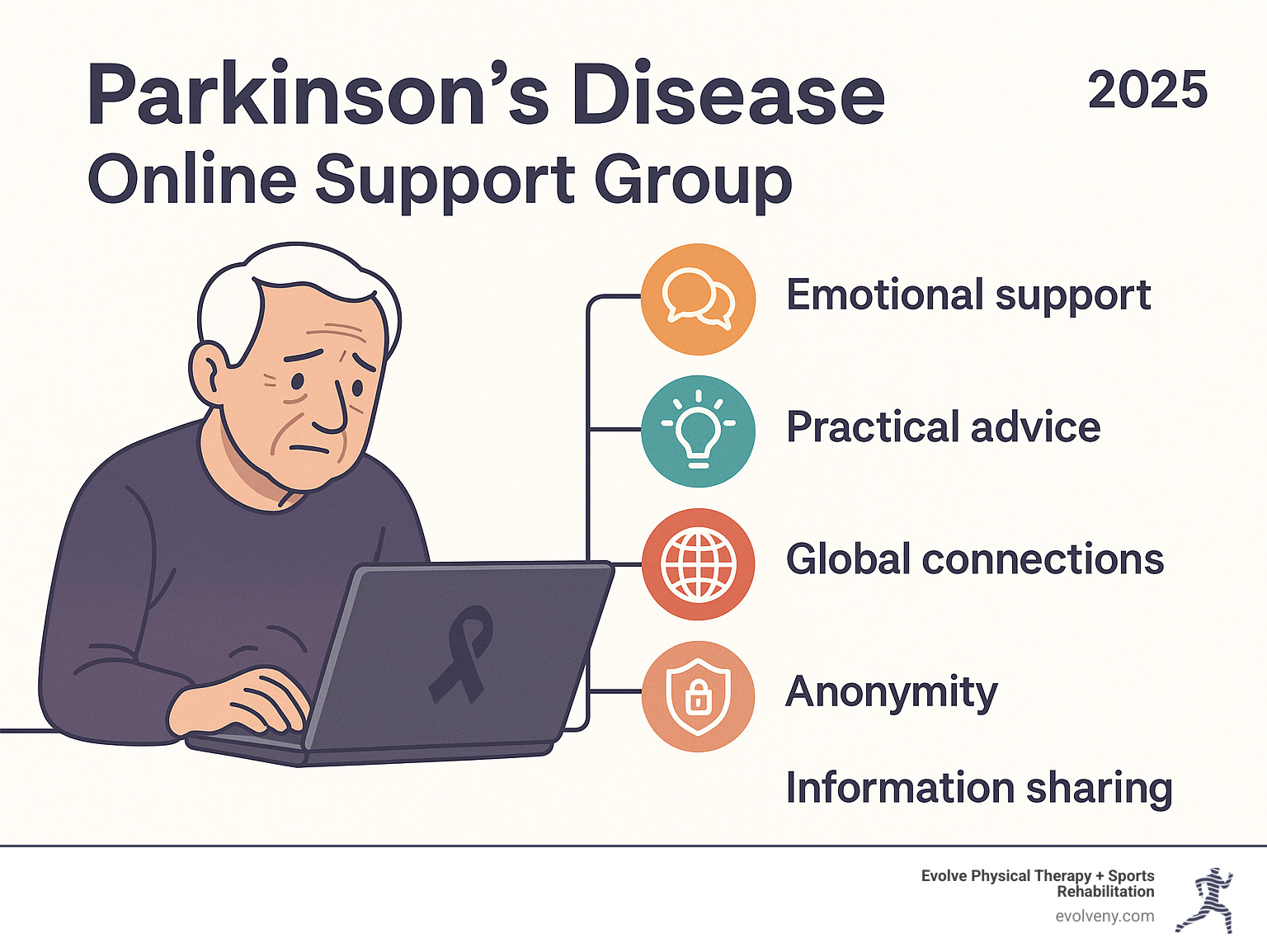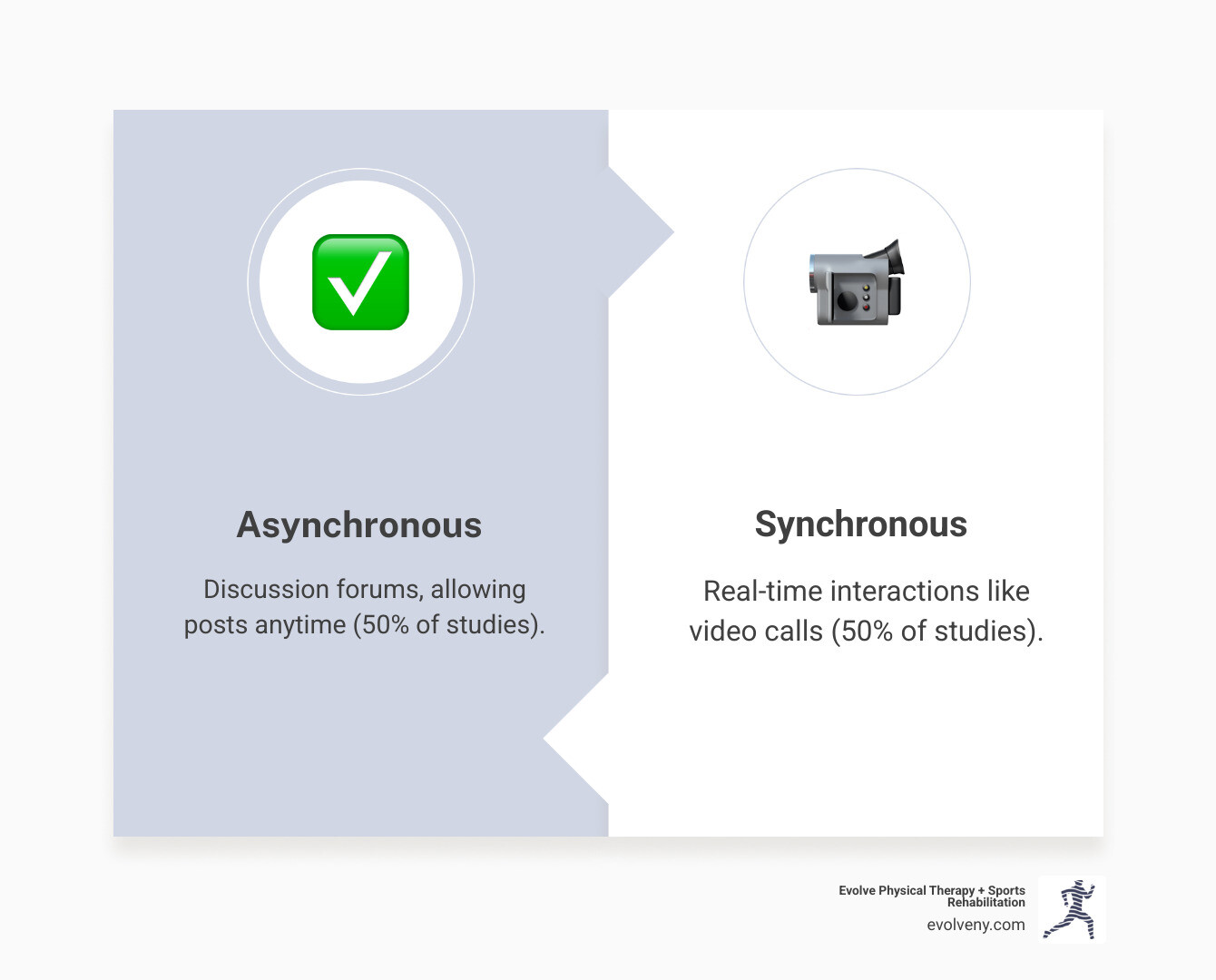Click, Connect, Cope: Parkinson's Disease Online Support Groups
Finding Your Community in a Digital World

Parkinson's disease online support group platforms connect thousands of people worldwide. Whether you're newly diagnosed, a longtime patient, or a caregiver, these digital communities offer 24/7 access to peer support, practical advice, and emotional understanding from others who truly "get it."
Quick Reference: Top Parkinson's Online Support Options
- Mayo Clinic Connect - Over 700 members, professionally moderated
- HealthOpen uped (Cure Parkinson's) - 21,000+ members from 84+ countries
- PD Conversations - Parkinson's Foundation's official community with 8 discussion groups
- PatientsLikeMe Forum - 20,000+ Parkinson's patient members
- Live Video Groups - Real-time support for patients, caregivers, and specific populations
Living with Parkinson's can feel isolating, as symptoms often make social activities challenging. But you're not alone. Online support groups have transformed how people with Parkinson's connect, learn, and cope. From message boards for late-night worries to live video chats with friendly faces, these communities offer genuine connection.
As a physical therapist with extensive experience treating neurological conditions like Parkinson's, I've seen how Parkinson's disease online support group participation complements traditional care. The resilience and knowledge gained from peers can significantly improve your overall wellness journey.

The Power of Connection: Why Join an Online Support Group?
Imagine a place where you can freely discuss your frustrations, celebrate small victories, or ask questions without having to explain Parkinson's from scratch. That's what a Parkinson's disease online support group offers: a powerful blend of emotional support, practical advice, and a profound reduction in isolation.
These online communities are a lifeline, overcoming geographical barriers and offering 24/7 access to support. The anonymity can be liberating when discussing sensitive topics, empowering members to seek and offer help on their own terms. Scientific research confirms the psychosocial benefits of peer support, showing it can significantly improve coping mechanisms and well-being. (Learn more about the psychosocial impact of peer support here).
What are the benefits of a Parkinson's disease online support group?
The benefits address both emotional and practical needs:
Peer validation provides immense comfort. When you share a challenge, like freezing or dyskinesia, and others respond with "I feel you!", it validates your experience and fosters a deep sense of belonging.
Online groups are treasure troves of information sharing. Members swap real-world tips on everything from managing medications to adaptive clothing. The Parkinson's Buddy Network, for example, had over 9,000 members from 84+ countries as of September 2022, showcasing the vast network of shared knowledge.
Members share personal coping strategies for symptoms like fatigue and anxiety. You'll also find support in navigating healthcare, learning from peers' experiences with doctors and treatments. Hearing from others at different stages offers valuable gaining perspective and can help in finding hope. These connections often blossom into genuine building friendships, combating the isolation of chronic illness.
Navigating Potential Challenges
While beneficial, it's wise to be aware of potential challenges:
- Misinformation: Peer advice is valuable but should never replace professional medical guidance. Always discuss new ideas with your healthcare team.
- Emotional Overload: Discussions can be heavy. It's okay to step away to protect your emotional well-being.
- Privacy Concerns: Be mindful of what you share. Consider the platform's anonymity and your comfort level.
- Lack of Non-Verbal Cues: In text-based forums, misunderstandings can occur without tone or body language.
- Group Dynamics: Not every group is the right fit. It's fine to try another until you find your community.
- Technical Difficulties: Some platforms can be challenging if symptoms affect dexterity, but many are user-friendly.
- Importance of Moderation: A well-moderated group ensures discussions are respectful, accurate, and supportive.
Online vs. In-Person Support: What's the Difference?
When seeking support, you might wonder whether an online or in-person group is best. Both offer value, and combining them can create a comprehensive support network.
Here's a comparison to help you decide:
| Feature | Online Support Groups | In-Person Support Groups |
|---|---|---|
| Flexibility | Access 24/7, post/read at your convenience. | Scheduled meetings, usually once a month. |
| Convenience | Participate from home, no travel required. | Requires travel to a physical location. |
| Travel Limitations | Ideal for those with mobility issues or in remote areas. | Can be challenging for those with significant physical limitations or living far from meeting sites. |
| Anonymity | High degree of anonymity possible, especially in text-based forums. | Less anonymity, face-to-face interaction. |
| Spontaneity | Post questions/seek advice immediately. | Advice/support available only during scheduled meetings. |
| Cost | Often free (internet access aside). | May involve travel costs, parking, or group fees. |
| Type of Interaction | Text-based discussions, video calls; can feel less personal. | Direct eye contact, body language, immediate non-verbal cues; can foster deeper immediate bonds. |
| Geographic Reach | Global connections, diverse perspectives. | Limited to local community, less diversity of experiences. |
| Physical Limitations | No physical barriers; accessible for all mobility levels. | Accessibility can be an issue depending on venue. |
Parkinson's disease online support group options excel in accessibility and flexibility. They are a fantastic choice if travel is difficult, you live in a remote area, or you prefer the privacy of home. The ability to get advice at any time is invaluable.
While online interactions can feel less personal, the global connections and shared experiences often compensate. The higher degree of anonymity can also make it easier to discuss sensitive topics. Even just reading posts and learning from others (known as "lurking") provides significant support and knowledge. Both online and in-person groups are vital; many find that a combination of the two offers the most robust support system.
Your Guide to Finding a Parkinson's Disease Online Support Group
Finding the right parkinson's disease online support group is a personal journey. Communities vary, from quiet, asynchronous forums where you can post anytime, to energetic real-time video chats. The best part is exploring to find what resonates with you.
Asynchronous Forums and Message Boards
These are like always-available bulletin boards, perfect for unpredictable schedules or connecting at your own pace.
Mayo Clinic Connect: This Parkinson's Disease Forum is moderated by Mayo Clinic staff, offering a reliable, expert-supported space. With over 700 members, it's an informed community that also includes a helpful 'Caregivers: Dementia' forum.
HealthOpen uped (Cure Parkinson's Community): This large community has over 21,000 members from 84+ countries. It's a lively space for sharing stories, discussing treatments, and exploring alternative therapies. Find their Cure Parkinson's Community here.
PD Conversations: The Parkinson's Foundation's platform offers eight moderated discussion groups for specific needs, such as "Newly Diagnosed," "Caregiver," and "Young Onset." Visit PD Conversations to explore.
PatientsLikeMe Forum: With over 20,000 Parkinson's patient members, this active community lets you connect with others who have similar health profiles to share information and learn from collective experiences. Find their forum here: PatientsLikeMe Forum.
Parkinson's UK Forum: A fantastic moderated space for those in the UK, with helpful sections like 'Daily Life' and a 'Creative Corner' that foster a supportive environment. Visit their UK-based forum.
Smart Patients: This platform partners with organizations like the APDA to offer a secure online community for patients and caregivers to discuss research and connect safely. Check out the Smart Patients Parkinson's Disease Community.
Live Video and Real-Time Chat Groups
For more immediate interaction, live video groups hosted on platforms like Zoom are a great option, offering a traditional support group feel from home.
Here is a list of general and specialty live video groups:
For Patients & Caregivers:
- Resilience Online: Offers various online programs, including supportive group sessions. pmdalliance.org/resilienceonline/
- Round Table Support Group: A regular virtual meeting for open discussion. parkinsonsresource.org/news/articles/round-table-6-pm-evergreen/
- Weekly Tuesday Group (PCLA): A consistent virtual meeting fostering community. bit.ly/supportgrouppcla
For Caregivers Only:
- Care Partner Connection: A dedicated space for caregivers to support each other. bit.ly/CarePartnerConnection
- Care Partner Monthly Meetup: Hosted by the Davis Phinney Foundation, focusing on caregiver needs. davisphinneyfoundation.org/event/parkinsons-care-partner-meetup/
- Adult Children Care Partners Support Group: For adult children caring for a parent with PD. https://www.parkinson.ca/resources/support-groups/virtual/
For Young Onset (YOPD):
- YOPD Connections: Custom for individuals diagnosed at a younger age. pmdalliance.org/yopdconnections/
- Women's Young Onset (YOPD) Support Group: A specialized group for women with YOPD. https://www.parkinson.ca/resources/support-groups/virtual/
- Young Onset Parkinson's Round Table: Another excellent choice for the YOPD community. parkinsonsresource.org/news/groups/
For Women:
- Sunday Mornings with Twitchy Women: A unique and supportive group for women with PD. twitchywoman.com/events/
- Virtual Women's Parkinson's Support Group: A safe space for women with Parkinson's. neurochallenge.org/program-calendar.html
For Men:
- Men with Parkinson's, with Charles Coverdale: A group designed for men to discuss their experiences. bit.ly/PCLAmenwithpd
For Specific Topics:
- DBS (Deep Brain Stimulation) Support Group: For those considering or living with DBS. pdactive.org/support-groups/#DBS
- Newly Diagnosed Support Group: Guidance and comfort for those recently diagnosed. airtable.com/shrK6GPwgzZ4IiJTH
- Living with Loss Bereavement Group: For caregivers and family grieving a loss. us02web.zoom.us/j/89505958738
Non-English Speaking:
- Spanish Moderated Discussion Group: A welcoming space for Spanish speakers on PD Conversations. pdconversations.org/s/topic/0TO3b000000kU5jGAE/espa%C3%B1ol
- Francophone Parkinson Support Group: For French-speaking individuals and families. https://www.parkinson.ca/resources/support-groups/virtual/
This is just a starting point. Don't be afraid to try a few different parkinson's disease online support group options to find a community where you feel comfortable, understood, and supported.
What to Expect: Support, Information, and Community
When you join a Parkinson's disease online support group, you enter a space designed for connection and help. It's a place where understanding flows freely among people who truly "get it."
You'll find emotional support to share your ups and downs without judgment. These groups are also packed with informational support, where members share real-world tips on managing symptoms, treatments, and daily living hacks. You'll also experience esteem support; seeing others steer challenges with resilience can boost your own confidence. The magic comes from shared lived experience—advice from people who walk in your shoes and understand the nuances of the disease.
How do I choose the right Parkinson's disease online support group?
Choosing the right group is a personal decision. Here’s a simple guide:
- Assess your needs: Are you looking for emotional comfort, practical advice, or connections with a specific demographic (e.g., young-onset, caregivers)?
- Consider the format: Do you prefer asynchronous forums or real-time video calls?
- Look for moderation: Well-moderated groups are safer and more helpful. Trusted organizations like the Mayo Clinic and the Parkinson's Foundation moderate their forums.
- Check for specific focus: Specialized groups for unique situations (e.g., caregivers for PD with dementia) can offer targeted support.
- Try a few groups: Explore different communities to find one where the tone and vibe feel right.
- Read the guidelines and observe: Before participating, read the community rules and "lurk" (read posts without posting) to get a feel for the group.
The Importance of Moderation
Moderation is crucial for a safe and beneficial Parkinson's disease online support group. A moderator acts as a guide and guardian for the community.
They ensure safety by protecting members from inappropriate content and scams. In health forums, they are vital in preventing misinformation, correcting inaccurate medical advice, and guiding members to reliable sources. Moderators also manage conflict, keeping discussions respectful and productive. This fosters a positive environment where everyone feels comfortable sharing. Whether moderated by professionals, like the Parkinson's Foundation's Helpline staff, or experienced peers, this oversight ensures the group remains a helpful and supportive resource.
What Does the Research Say About Online Support?
The benefits of a Parkinson's disease online support group are not just anecdotal; they are backed by science. Current research strongly supports the positive impact of online peer support for people living with Parkinson's.
A large systematic review of nearly 11,000 articles found 8 high-quality studies on the topic. The quality was impressive, with 63% (5 of 8) rated as good or high quality. This provides a solid evidence base for how helpful these groups can be.

Research showed a perfect 50/50 split between studies on asynchronous communication (like discussion forums) and real-time communication (like video calls), highlighting the adaptability of online platforms.
The research consistently points to several powerful benefits:
Empowerment and Self-Efficacy: By sharing and learning with others, you gain information and feel more capable of managing your symptoms and daily life. It's a confidence boost from a community that understands.
Reduced Depression and Social Connectedness: Online communities are a powerful antidote to loneliness and can significantly reduce feelings of depression. As one user noted in a review, "I am glad I found this forum, makes me feel like I am not alone."
Rich Exchange of Knowledge and Support: A deep dive into patient conversations reveals a vibrant exchange of lived experiences, emotional support, and practical advice not found in textbooks. Members discuss specific medication questions and often overlooked symptoms. This ability to share and reflect is incredibly therapeutic. You can learn more about patient communication in online health forums through this thematic analysis of patient communication.
Even "lurking"—reading posts without actively participating—provides significant social support and valuable information.
Conclusion: Take the Next Step in Your Parkinson's Journey
We've explored the remarkable resource of Parkinson's disease online support group communities. These digital spaces are vibrant hubs of understanding, practical advice, and genuine human connection. Whether you prefer a quiet message board or a lively video call, there's a digital home waiting to welcome you.
The power of shared experience is immense. Finding your "tribe"—people who truly understand the nuances of living with Parkinson's—is a cornerstone for managing your well-being, helping you feel less alone and more in control.
At Evolve Physical Therapy + Sports Rehabilitation in Brooklyn, we believe in a holistic approach to managing Parkinson's disease. While we focus on hands-on therapy to strengthen your body, we know emotional and informational support are just as vital. Online support groups perfectly complement the physical work we do, helping you build resilience and maintain a positive outlook.
We're proud of our specialized programs for Parkinson's patients, including our Rock Steady Boxing program, which was featured on NBC News. Combining our therapies with the support found in online communities creates a comprehensive strategy for living your best life with Parkinson's.
Take that next step today—join a supportive online community and reach out to Evolve Physical Therapy to learn more about how our Rock Steady Boxing and other specialized Parkinson's programs can support your journey.

